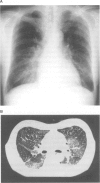Abstract
Sporadic cases have developed pulmonary toxicity after receiving chemotherapy and granulocyte colony-stimulating factor (G-CSF). However, because such cases received chemotherapy that alone frequently causes pulmonary toxicity, the role of G-CSF in this toxicity has been unclear. CHOP therapy (cyclophosphamide, doxorubicin, vincristine and prednisolone) only slightly induces pulmonary toxicity. However, we observed a considerable incidence of this toxicity in non-Hodgkin's lymphoma subjects receiving CHOP therapy and G-CSF (6 out of 52 subjects, 11.5%). In this cohort, among various characteristics, including the dose and interval of CHOP therapy, only the mean peak leucocyte count (MPLC) with each therapy cycle was associated with development of this toxicity (MPLC > or = 23.0 x 10(9) l(-1), 6 out of 29 cases; MPLC < 23.0 x 10(9) l(-1), 0 out of 23 cases; P = 0.020). These findings suggest that the effect of G-CSF is the main determinant of the pulmonary toxicity in these cases. Because the toxicity was associated with a large MPLC and did not recur in cases readministered G-CSF, an idiosyncratic reaction to G-CSF is unlikely to be the pathogenesis of this toxicity. Thus, lowering the G-CSF dose seems to be useful in the prevention of this toxicity. In all six cases, the time course of manifestation of the toxicity was the same, and early application of high-dose corticosteroid led to cure. This knowledge will be helpful in the care of similar cases.
Full text
PDF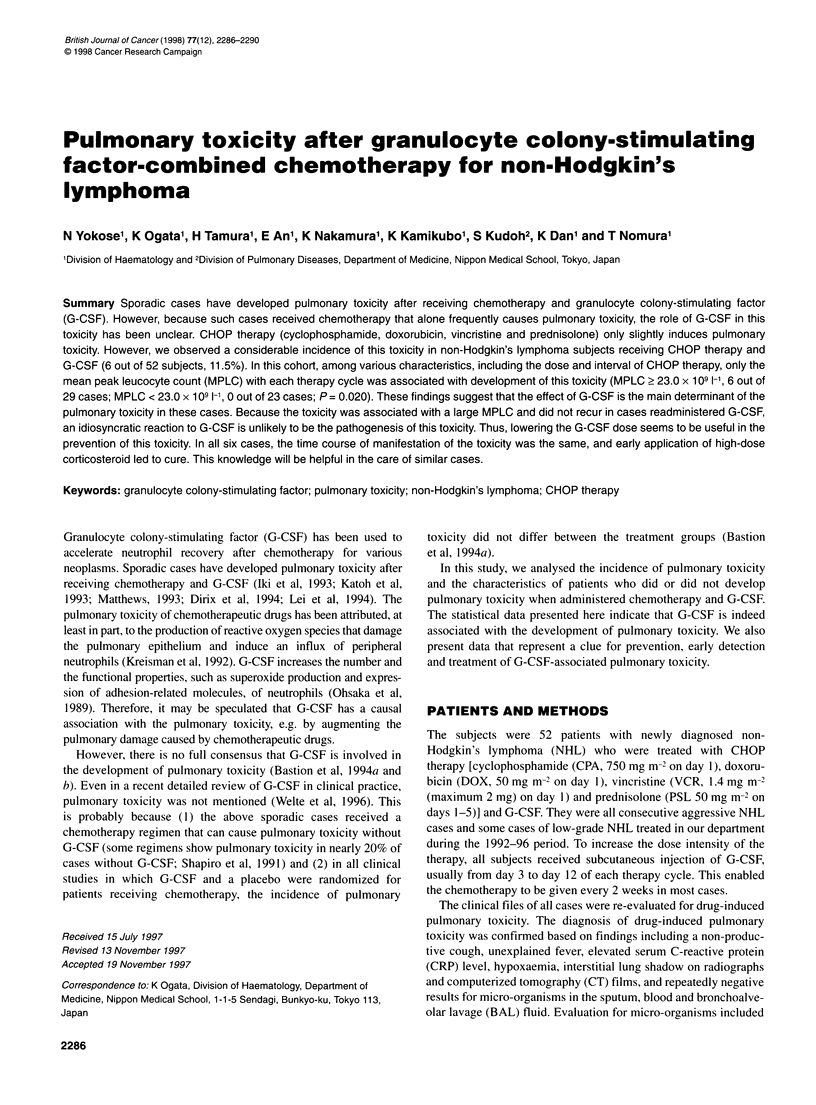
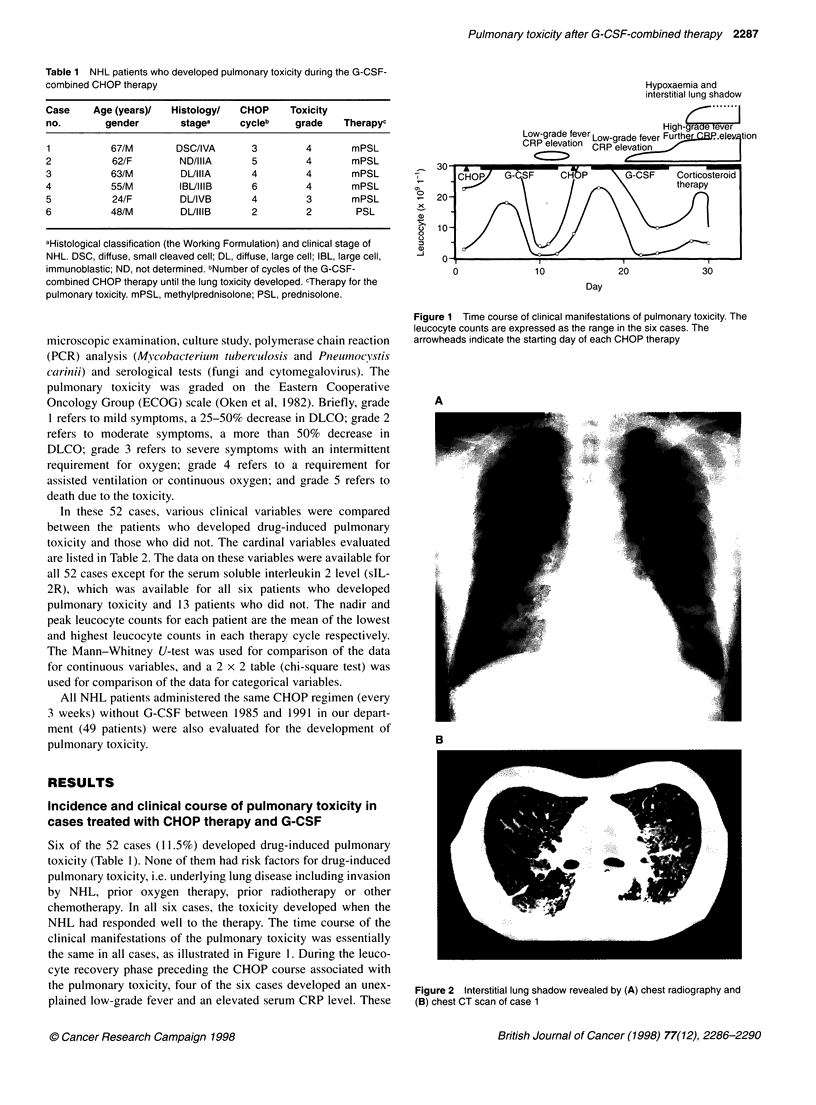
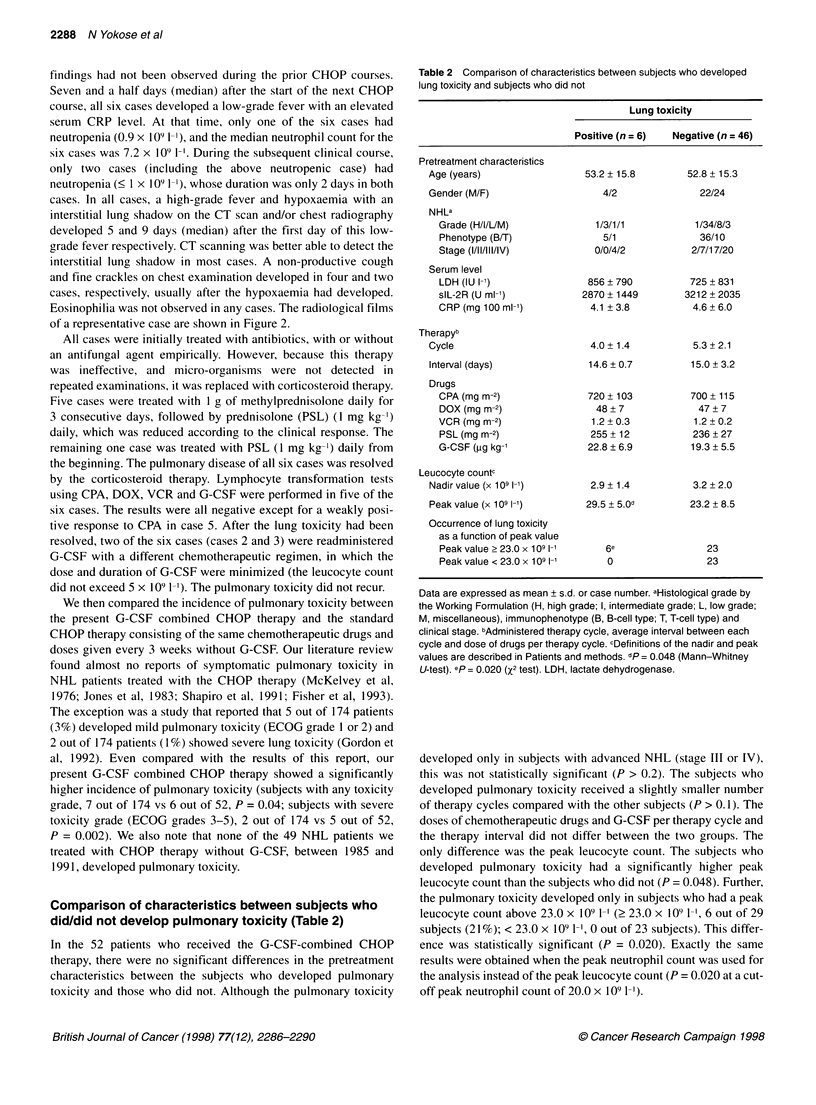
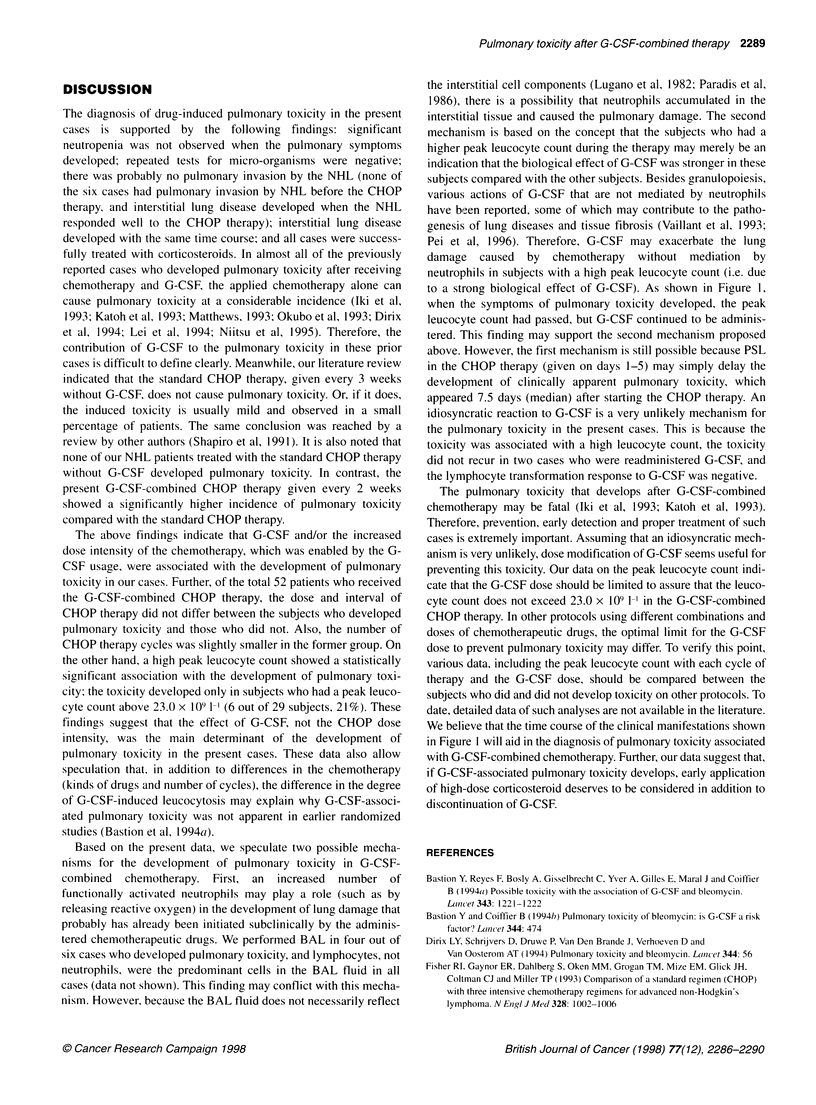
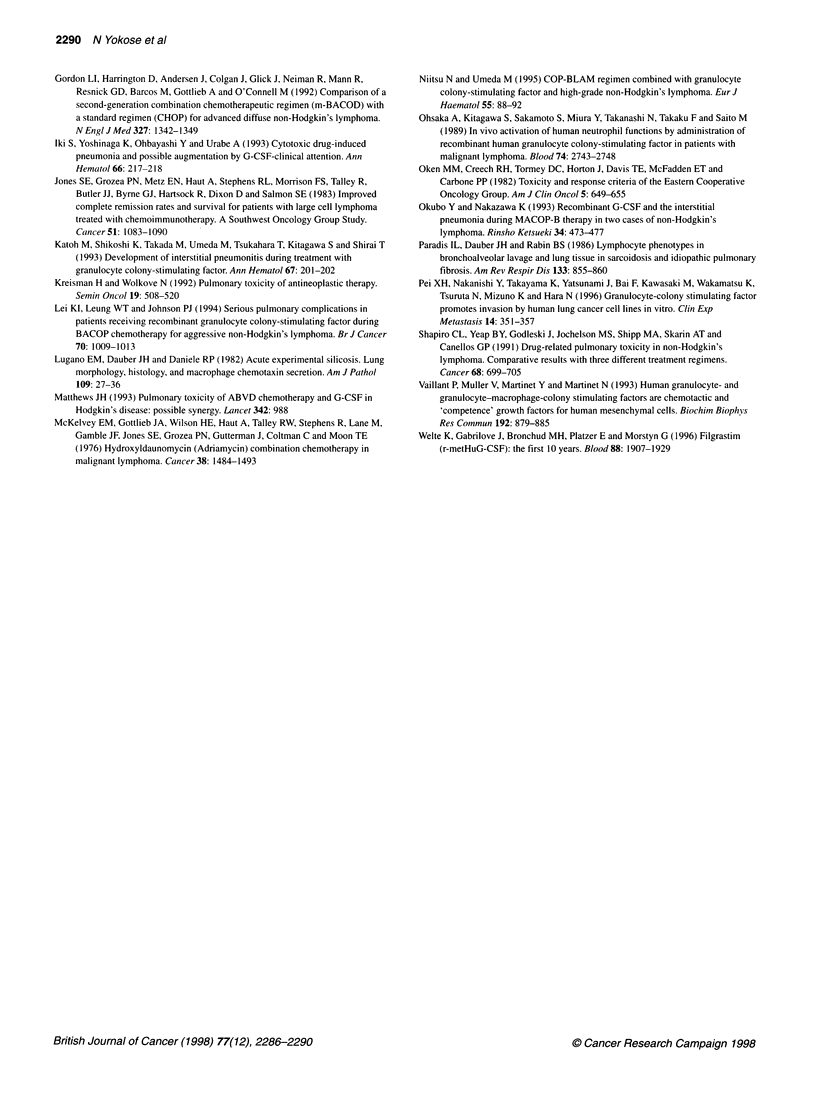
Images in this article
Selected References
These references are in PubMed. This may not be the complete list of references from this article.
- Dirix L. Y., Schrijvers D., Druwè P., Van den Brande J., Verhoeven D., Van Oosterom A. T. Pulmonary toxicity and bleomycin. Lancet. 1994 Jul 2;344(8914):56–56. doi: 10.1016/s0140-6736(94)91076-6. [DOI] [PubMed] [Google Scholar]
- Fisher R. I., Gaynor E. R., Dahlberg S., Oken M. M., Grogan T. M., Mize E. M., Glick J. H., Coltman C. A., Jr, Miller T. P. Comparison of a standard regimen (CHOP) with three intensive chemotherapy regimens for advanced non-Hodgkin's lymphoma. N Engl J Med. 1993 Apr 8;328(14):1002–1006. doi: 10.1056/NEJM199304083281404. [DOI] [PubMed] [Google Scholar]
- Gordon L. I., Harrington D., Andersen J., Colgan J., Glick J., Neiman R., Mann R., Resnick G. D., Barcos M., Gottlieb A. Comparison of a second-generation combination chemotherapeutic regimen (m-BACOD) with a standard regimen (CHOP) for advanced diffuse non-Hodgkin's lymphoma. N Engl J Med. 1992 Nov 5;327(19):1342–1349. doi: 10.1056/NEJM199211053271903. [DOI] [PubMed] [Google Scholar]
- Iki S., Yoshinaga K., Ohbayashi Y., Urabe A. Cytotoxic drug-induced pneumonia and possible augmentation by G-CSF--clinical attention. Ann Hematol. 1993 Apr;66(4):217–218. doi: 10.1007/BF01703240. [DOI] [PubMed] [Google Scholar]
- Jones S. E., Grozea P. N., Metz E. N., Haut A., Stephens R. L., Morrison F. S., Talley R., Butler J. J., Byrne G. E., Jr, Hartsock R. Improved complete remission rates and survival for patients with large cell lymphoma treated with chemoimmunotherapy. A Southwest Oncology Group Study. Cancer. 1983 Mar 15;51(6):1083–1090. doi: 10.1002/1097-0142(19830315)51:6<1083::aid-cncr2820510619>3.0.co;2-m. [DOI] [PubMed] [Google Scholar]
- Katoh M., Shikoshi K., Takada M., Umeda M., Tsukahara T., Kitagawa S., Shirai T. Development of interstitial pneumonitis during treatment with granulocyte colony-stimulating factor. Ann Hematol. 1993 Oct;67(4):201–202. doi: 10.1007/BF01695869. [DOI] [PubMed] [Google Scholar]
- Kreisman H., Wolkove N. Pulmonary toxicity of antineoplastic therapy. Semin Oncol. 1992 Oct;19(5):508–520. [PubMed] [Google Scholar]
- Lei K. I., Leung W. T., Johnson P. J. Serious pulmonary complications in patients receiving recombinant granulocyte colony-stimulating factor during BACOP chemotherapy for aggressive non-Hodgkin's lymphoma. Br J Cancer. 1994 Nov;70(5):1009–1013. doi: 10.1038/bjc.1994.439. [DOI] [PMC free article] [PubMed] [Google Scholar]
- Lugano E. M., Dauber J. H., Daniele R. P. Acute experimental silicosis. Lung morphology, histology, and macrophage chemotaxin secretion. Am J Pathol. 1982 Oct;109(1):27–36. [PMC free article] [PubMed] [Google Scholar]
- Matthews J. H. Pulmonary toxicity of ABVD chemotherapy and G-CSF in Hodgkin's disease: possible synergy. Lancet. 1993 Oct 16;342(8877):988–988. doi: 10.1016/0140-6736(93)92033-p. [DOI] [PubMed] [Google Scholar]
- McKelvey E. M., Gottlieb J. A., Wilson H. E., Haut A., Talley R. W., Stephens R., Lane M., Gamble J. F., Jones S. E., Grozea P. N. Hydroxyldaunomycin (Adriamycin) combination chemotherapy in malignant lymphoma. Cancer. 1976 Oct;38(4):1484–1493. doi: 10.1002/1097-0142(197610)38:4<1484::aid-cncr2820380407>3.0.co;2-i. [DOI] [PubMed] [Google Scholar]
- Niitsu N., Umeda M. COP-BLAM regimen combined with granulocyte colony-stimulating factor and high-grade non-Hodgkin's lymphoma. Eur J Haematol. 1995 Aug;55(2):88–92. doi: 10.1111/j.1600-0609.1995.tb01815.x. [DOI] [PubMed] [Google Scholar]
- Ohsaka A., Kitagawa S., Sakamoto S., Miura Y., Takanashi N., Takaku F., Saito M. In vivo activation of human neutrophil functions by administration of recombinant human granulocyte colony-stimulating factor in patients with malignant lymphoma. Blood. 1989 Dec;74(8):2743–2748. [PubMed] [Google Scholar]
- Oken M. M., Creech R. H., Tormey D. C., Horton J., Davis T. E., McFadden E. T., Carbone P. P. Toxicity and response criteria of the Eastern Cooperative Oncology Group. Am J Clin Oncol. 1982 Dec;5(6):649–655. [PubMed] [Google Scholar]
- Okubo Y., Nakazawa K. [Recombinant G-CSF and the interstitial pneumonia during MACOP-B therapy in two cases of non-Hodgkin's lymphoma]. Rinsho Ketsueki. 1993 Apr;34(4):473–477. [PubMed] [Google Scholar]
- Paradis I. L., Dauber J. H., Rabin B. S. Lymphocyte phenotypes in bronchoalveolar lavage and lung tissue in sarcoidosis and idiopathic pulmonary fibrosis. Am Rev Respir Dis. 1986 May;133(5):855–860. [PubMed] [Google Scholar]
- Pei X. H., Nakanishi Y., Takayama K., Yatsunami J., Bai F., Kawasaki M., Wakamatsu K., Tsuruta N., Mizuno K., Hara N. Granulocyte-colony stimulating factor promotes invasion by human lung cancer cell lines in vitro. Clin Exp Metastasis. 1996 Sep;14(4):351–357. doi: 10.1007/BF00123394. [DOI] [PubMed] [Google Scholar]
- Shapiro C. L., Yeap B. Y., Godleski J., Jochelson M. S., Shipp M. A., Skarin A. T., Canellos G. P. Drug-related pulmonary toxicity in non-Hodgkin's lymphoma. Comparative results with three different treatment regimens. Cancer. 1991 Aug 15;68(4):699–705. doi: 10.1002/1097-0142(19910815)68:4<699::aid-cncr2820680406>3.0.co;2-5. [DOI] [PubMed] [Google Scholar]
- Vaillant P., Muller V., Martinet Y., Martinet N. Human granulocyte- and granulocyte-macrophage-colony stimulating factors are chemotactic and "competence" growth factors for human mesenchymal cells. Biochem Biophys Res Commun. 1993 Apr 30;192(2):879–885. doi: 10.1006/bbrc.1993.1497. [DOI] [PubMed] [Google Scholar]
- Welte K., Gabrilove J., Bronchud M. H., Platzer E., Morstyn G. Filgrastim (r-metHuG-CSF): the first 10 years. Blood. 1996 Sep 15;88(6):1907–1929. [PubMed] [Google Scholar]



